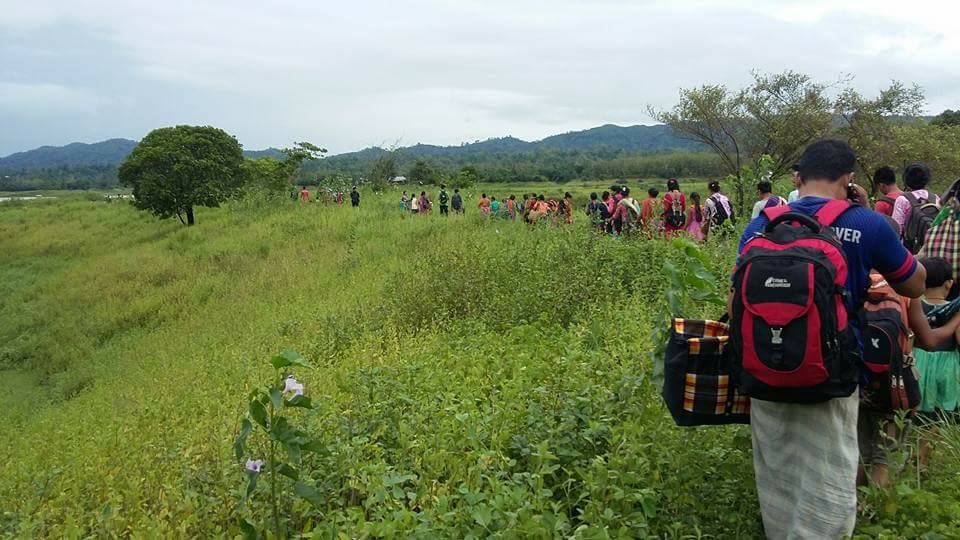| Home |
| CHT |
| Background |
| Bengali Settlers |
| Armed Resistance |
| Massacres |
| Genocide |
| Religious Persecution |
| Rapes & Abductions |
| Chakma Refugees |
| CHT Treaty |
| Foreign Aid |

|
|
16 August 1947: Viceroy’s Personal Reports on Chittagong Hill Tracts
It was on Tuesday, August 12, that I was finally informed by Radcliffe that his awards would be ready by noon the following day, just too late for me to see before leaving for Karachi. For some time past, I and my staff had been considering the question of when and how these awards should be published. From the purely administrative point of view, there were considerable advantages in immediate publication so that the new boundaries could take effect from August 15, and the officials of the right Dominion could be in their places to look after the districts which had been allotted to their side before that date. However, it had been obvious all along that, the later we postponed publication, the less would the inevitable odium react upon the British.
The matter came to a head at the Meeting which I held with members of my staff on the evening of the 12th. The Bengal award had by then been sent in but I had deliberately refrained from reading it. I was told however that it allotted the Chittagong Hill Tracts to Pakistan. My Reforms Commissioner, V.P. Menon, was present at the meeting and was able to warn me of the disastrous effect that this was likely to have on the Congress leaders. He went so far as to say that Nehru and Patel were both certain to blow up, since they had only recently assured a delegation from the Chittagong Hill Tracts that there was no question of their being allotted to Pakistan (V.P. Menon admitted that they had no possible authority for making such a statement).
V.P. Menon went on to say that if the details of award were given to them before the 15th he thought they might well refuse to attend the meeting of the Constituent Assembly which I was to address. If given to them later in the day he thought they would refuse to come to the State banquet and the evening party. In any case he said that unless the situations were handled with the utmost care, Congress would blow up. I have never known V.P. Menon to mislead me and I decided that somehow we must prevent the leader from knowing the details of the award until after August 15; all our work and the hope of good Indo British relations on the day of the transfer of power would risk being destroyed if we could not do this.
On August 13, I therefore wrote to Jinnah and Nehru telling them that I had not received all the awards by the time I left for Karachi, though I expected them that afternoon; and suggesting that there should be a meeting at Government House on August 16 to decide upon the timing and method of publication, and also the method of implementing the undertaking of the Partition Council to accept the award and to enforce the decisions contained in it.
Just as I was signing the letter to Nehru a letter arrived from Patel which is so incredible that I attach a copy of the complete letter as Appendix III. From this it will be seen that the one man I had regarded as a real statesman with both feet firmly on the ground, and a man of honour whose word was his bond, had turned out to be as hysterical as the rest. Here he was suggesting that if indeed the Chittagong Hill Tract were put into East Bengal the people would be justified in resisting this award by force and that the Central Government would be bound to support them. So much for his undertaking on behalf of India to accept and implement the awards whatever they might be.
The crazy part about all this is that Burrows had explained to me that the whole economic life of the people of the Hill Tracts depends upon East Bengal, that there are only one or two indifferent tracks through the jungle into Assam, and that it would be disastrous for the people themselves to be cut off from East Bengal. The population consists of less than a quarter of a million, nearly all tribesmen who, if they have any religion at all, are Buddhists (and so are technically non-Muslims, under the terms of the Boundary Commission). In a sense Chittagong, the only part of East Bengal, also depends upon the Hill Tracts; for if the jungles of the latter were subjected to unrestricted felling, I am told that Chittagong port would silt up. Candidly I was amazed that such a terrific crisis should have blown up over so small a matter. However, I have been long enough in India to realize that major crises are by no means confined to big matters.
Once more I had cause to thank the invaluable V.P. Menon for deliverance from the disaster which would have followed on my publishing the awards in good faith without prior reference to the leaders. Having decided not to announce the awards before August 15, I had no alternative but to send instructions to the Governors that the Governments of the two halves of the split Provinces would have to take charge up to the national boundary on August 15, pending publication and implementation of the awards or of mutually agreed boundaries.
Sources:
Mountbatten and the Partition of India by Larry Collins and Dominique Lapierre, Pages 277 to 279
comments powered by Disqus